La Guardia Mora is a podcast about the cultural history between Morocco and Spain. On this occasion, we were able to talk with its founder, Yasmina Aidi, who answered some questions to give us an insight into the history and development of this wonderful project.
Presentation of the podcast
La Guardia Mora is a podcast that adopts a decolonial perspective to analyse the socio-cultural, economic and political phenomena that take place in the region of the Strait of Gibraltar and in the context of relations between Spain and Morocco. The podcast is researched, directed and presented by Yasmina Aidi, with the collaboration of Nouhad Boudih, Ernesto Maleno and Soukaina Ghailan. The project raises fundamental questions about the cultural links, identity issues and historical-political intertwining that characterise the Spanish-Moroccan relationship, through dialogues marked by humour, irony and the experiences of the new generations. The name is obviously a way of appropriating certain terms, while at the same time marking a sarcastic tone of derision, because sometimes History (with capital letters) is truly delirious and the only way to expand it to fit more voices and lives is through mockery and its unique capacity to dismantle and fracture official or state narratives and discourses.
Our podcast seeks to dismantle stereotypes and prejudices, providing tools to understand the complexity of relations between these two countries. We believe it is essential to approach these issues from a decolonial perspective, recognising the shared, continuing history and the asymmetries of power that have shaped Spanish-Moroccan relations. Looking at the Strait of Gibraltar as a point of continuity and not the opposite. We aim to give voice to the experiences and perspectives of the younger generations while also always keeping a place for the oral memory that has shaped us, which often find themselves navigating between different identities and cultures. The idea is that through an approach that starts from academic research we give way to informal conversations that challenge simplistic and reductionist narratives.
Photo of the members of La Guardia Mora at Universidad Autónoma de Madrid.
The beginnings of La Guardia Mora
Nouhad, Ernesto and I (Yasmina) are from Tangiers, a crucial detail in our history. We attended the same Spanish school and high school in the city, and our lives have been profoundly influenced by the same factors: northern Morocco’s particular relationship with Hispanism and the tangible border that separates the two countries. We have been in contact for many years now, and one of the recurring topics we talked about was being an immigrant, from here and there, traversed by unprivileged social classes and by some quite hard and complex processes of foreignisation. The podcast seemed to be the most appropriate platform to democratise and disseminate the knowledge I gather in my research and to create a device that could re-articulate relations between these two countries.
Yasmina started the idea, more or less at the time of the Pandemic, as a way of channelling her work as a university professor and researcher in the United States, focused on Iberian-Moroccan cultural history, and who also maintains a constant relationship with Spain and of course with Morocco, although she does not live in these countries all year round. I didn’t want (Yasmina) to do something purely academic, but rather to think of a project of a certain popular erudition that would be crossed by the day-to-day life of those who live in the current situation of Moroccan-Spanish relations. That’s why I suggested it to several friends after Nouhad, who was the first one with whom we began to plan the project; and after several tests, we managed to make it work with her and Ernesto. Between the three of us we were able to produce a theoretical and analytical result that was profoundly political as well as personal and experiential. We managed to launch the podcast at the end of 2022, with all the work done online. A year later we incorporated Sukaina, who brings us the perspective of the sons and daughters of immigrants born in Spain that we don’t have. That’s why we use a mixture of Moroccan Darija and Spanish, what I call Darijiñol, to highlight the contemporary identity crossover while at the same time giving importance to our culture without having to eliminate the language altogether to appear to be what we are not. Trying to be faithful to what we are and not making an identity fool of ourselves by speaking in English, for example!
I didn’t want to do something purely academic, but rather to think of a project of a certain popular erudition that would be crossed by the day-to-day life of those who live in the current situation of Moroccan-Spanish relations.
In addition to our historical context and research, this project arose from our get-togethers: the anecdotes we shared were always very similar and provided us with a moment of relief and calm. Apart from sharing it among ourselves, we have found people who identify with us, and we said to ourselves, why not start a project in which we could give a voice to many people who are in the same situation as us? To give an explanation and some historical data to what we are going through, and above all, to validate it. What we are going through seems isolated, but in reality many people identify with it. We spent a long time trying to get it off the ground, I think we recorded the first episode at the beginning of 2021 and it took us almost a year to get back into the rhythm of the recordings.
Photo during the recording process.
Main difficulties in launching and developing the podcast
Maintaining projects such as La Guardia Mora is a major challenge, as addressing issues with rigour and evidence requires a considerable investment of time. One of the main difficulties we face is the scarcity of funding for initiatives that combine a humanistic, scientific and social approach. Our podcast is self-financed and self-managed, which means that each episode can take up to ten hours of work and sometimes days, if we have to wait for books to arrive. This process includes exhaustive research in libraries and digital archives to contextualise each episode, the collection of audio from our listeners, the meticulous editing of audio and video, and the collection of a No-Do that has something to do with the topic we are dealing with. Moreover, keeping our community active on social networks is an additional challenge, as it involves combining historical elements with a current language based on memes and reinterpretations of imaginaries from other generations.
Despite these challenges, our commitment to offer a rigorous and contrasted analysis of the complex Spanish-Moroccan relations drives us to preserve this project. We firmly believe in the importance of generating spaces for dialogue and critical reflection that contribute to dismantling stereotypes and fostering greater understanding between the two societies. However, in order to guarantee the sustainability and impact of initiatives such as La Guardia Mora, it is essential to have financial support that recognises the value of this type of projects and allows their creators to dedicate the time and resources required to develop quality content. Sadly, in our regions we still do not fully accept the need to finance or pay for the consumption of contrasted information. Patronage platforms do not work at all, which means that sooner or later these types of initiatives will end up dying out due to a lack of collaboration from both cultural institutions and listeners, and other narratives based on the mobilisation of false and simplistic realities will take centre stage.
In order to guarantee the sustainability and impact of initiatives such as La Guardia Mora, it is essential to have financial support. Sadly, in our regions we still do not fully accept the need to finance or pay for the consumption of contrasted information.
Topics covered in the podcast during these two seasons
In each episode we dive into a specific topic, from the influence of Andalusian music on Moroccan popular culture to the challenges of migration and integration, we address a wide range of issues that reflect the diversity and dynamism of Spanish-Moroccan relations. At La Guardia Mora, we are deeply committed to any content that contributes to bringing Morocco and Spain closer together, especially those that avoid hierarchical or vertical representations. We are particularly interested in topics that demonstrate the existence of alternative ways of relating to each other in the past, where the hatred, rejection or differentiation that we witness today were not so prominent.
For example, we dedicate an episode to exploring the concept of “la-hshuma”, essential to understanding Moroccan society, while in “The Musical Feminine” we dive into the fascinating world of the divas of Maghrebi popular song. Football also features prominently in our discussions, analysing both the intense hatred that arose in Spanish social networks and the immense human excitement we experienced when we saw ourselves represented on the international stage through the diaspora at the World Cup in Qatar. We also address crucial issues such as the 1985 Law on Foreigners and what it meant to enter the imagined Schengen area. The experiences of children of immigrants in “Lo-Generacional”, nightlife and partying in Morocco and Spain in “Lo-nocturno”, or more emotional and complicated topics such as mixed relationships in “Lo-Mixto relacional”. And, of course, we cannot forget one of our most important episodes, dedicated to the foreign educational systems in Morocco under the idea of the “civilising mission”, which for us is one of the biggest Spanish cultural diplomatic failures in Morocco.
All these topics have a deep meaning for us and our guests, on a personal, national and geopolitical level. The key to our approach lies in spontaneity and authenticity: nothing is scripted, but we share our experiences and invite others to do the same, with the aim of reflecting together and out loud.
Why is the content generated in La Guardia Mora important?
Our aim with La Guardia Mora is to circulate this mixed culture, creating a space where we can recover lines of affection lost and erased from history in the name of a whitewashed modernity, highlighting both individual and collective experiences. Hopefully it is serving to provide tools to dismantle stereotypes and prejudices in the face of willful and deliberate ignorance about the neighbouring country.
Hopefully it is providing tools to dismantle stereotypes and prejudices in the face of willful and deliberate ignorance about the neighbouring country.
We already know that the media, social networks, the writing of history, and lately even our own collaboration, have done a lot of damage to the image of migrants of Maghrebi, African and Muslim origin and that of the diaspora, turning us into the common enemy. In the Spanish case, it is important to know that this image has been centuries in the making, and that it is activated as needed. We are given stereotypes that make inclusion quite complicated, because most of the time you are struggling to dismantle them and not be seen as a threat. Talking about integration or assimilation, forgetting the origin and the impossibility of forging a double or cross issue (which is much richer and brings much more to the countries by the way) is the main cliché that needs to be stopped.
By way of conclusion
Unlike in other European countries, the silencing of a mixed culture in Spain is obvious. There is an immense concern to curb the possibility that we could be the same or that there could be shared parts with Morocco. The fear of belonging to the-moro is unimaginable, but the constant denial of this rejection is even more absurd. This preference for keeping the shores separated by force is a false and forced historical and identity-based act; there is another reality and even other realities to be known, it is really not that difficult to see them. You just have to have interest, respect and eliminate the alienated superiority from which one knows.
This preference for keeping the shores separated by force is a false and forced historical and identity-based act; there is another reality and even other realities to be known, it is really not that difficult to see them.
Our reality, and that of many people, is what it is, heterogeneous; and it gives rise to wonderful human encounters, creations and politicised artistic devices. There is no need to create what-is-ours from what-is-imposed, nor to reduce our complexities to make them more stereotypical, comfortable to consume and that do not question the initial (dis)knowledge. Yes, it costs more to do it this way, but in the long run it will be more worthwhile to be speaking from where we really are than to adulterate a universal-white-non-intersectional identity that we do not have (nor want), although we do understand it because it is what we have always sucked from cultural imperialisms and borders. The elimination of certain oral memories, sometimes, is so that we don’t see the continuation of the dominant narrative. In short, it is a good time to make a cultural shift from which to begin to understand that we are, after all, the result of both the politics of the past and the cultural overflow of the present.
The members of La Guardia Mora.
Podcast La Guardia Mora

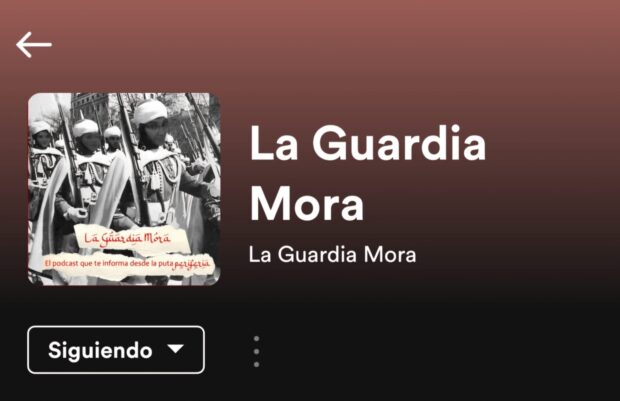
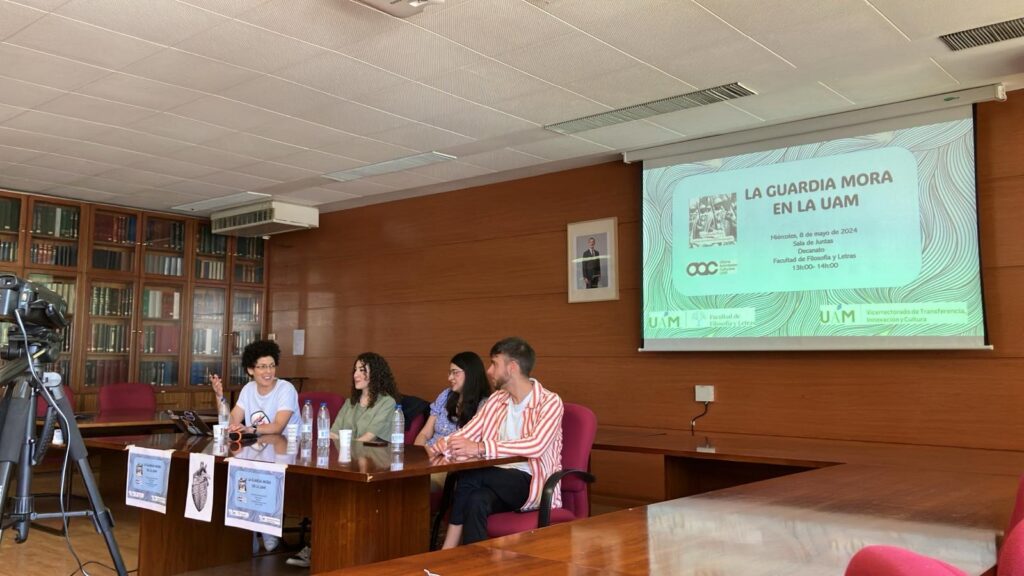
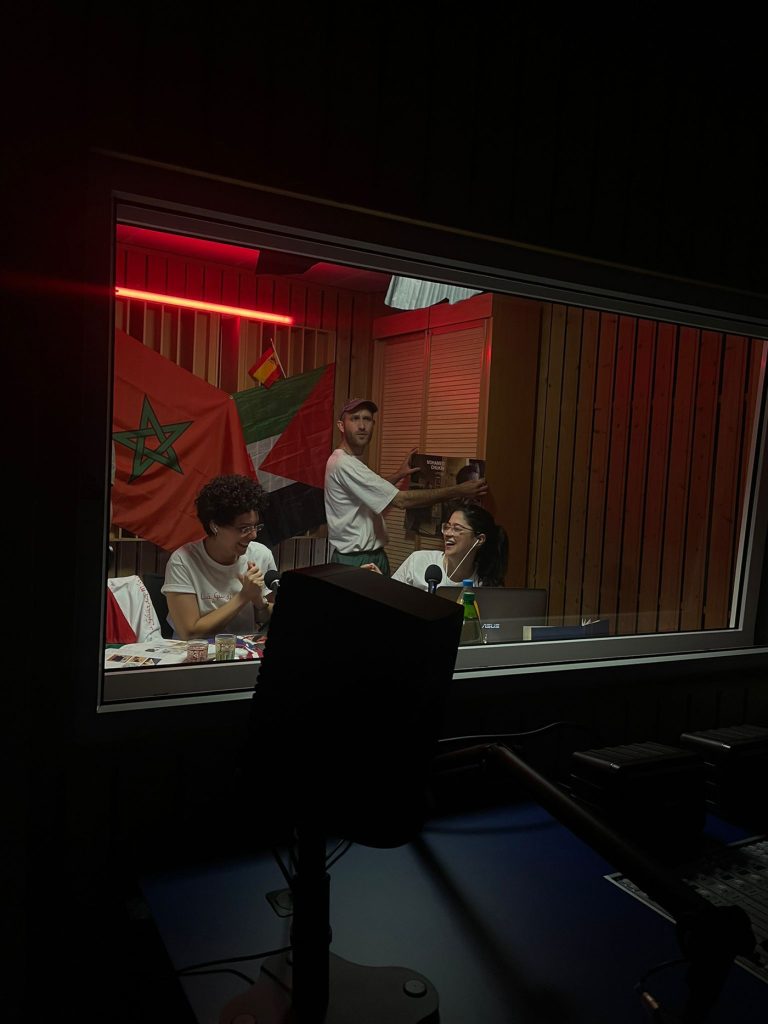
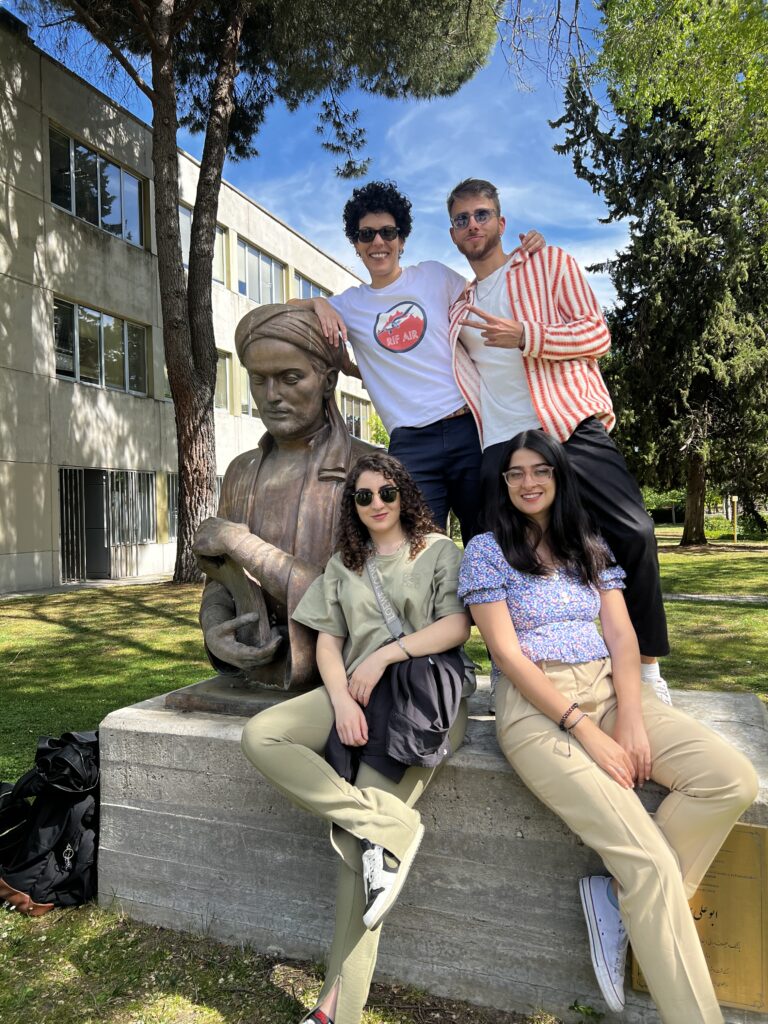



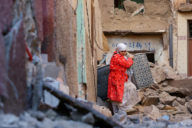









No Comments